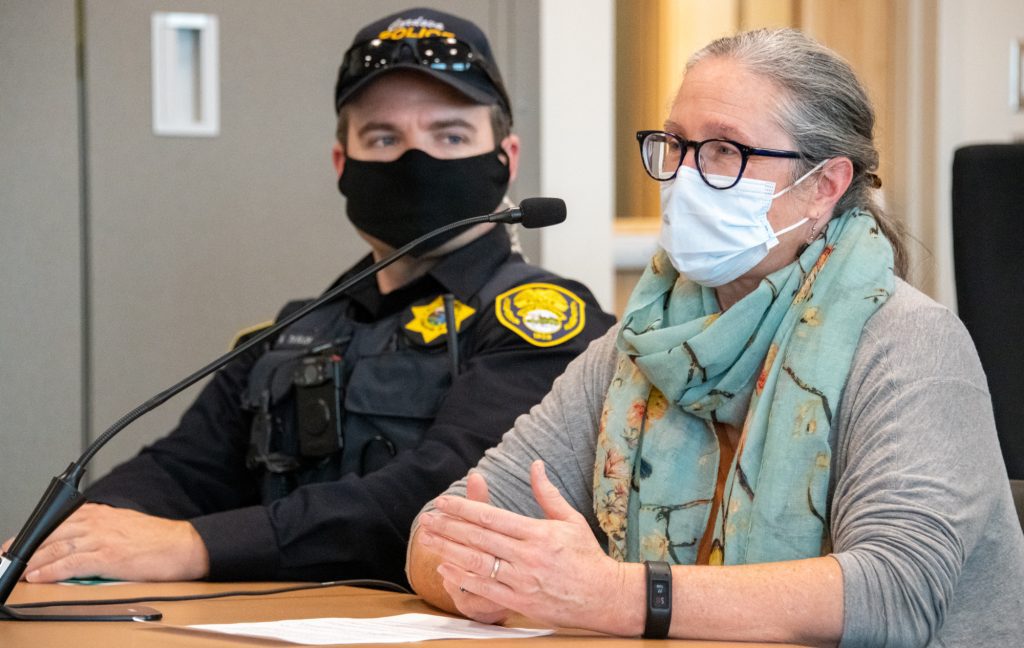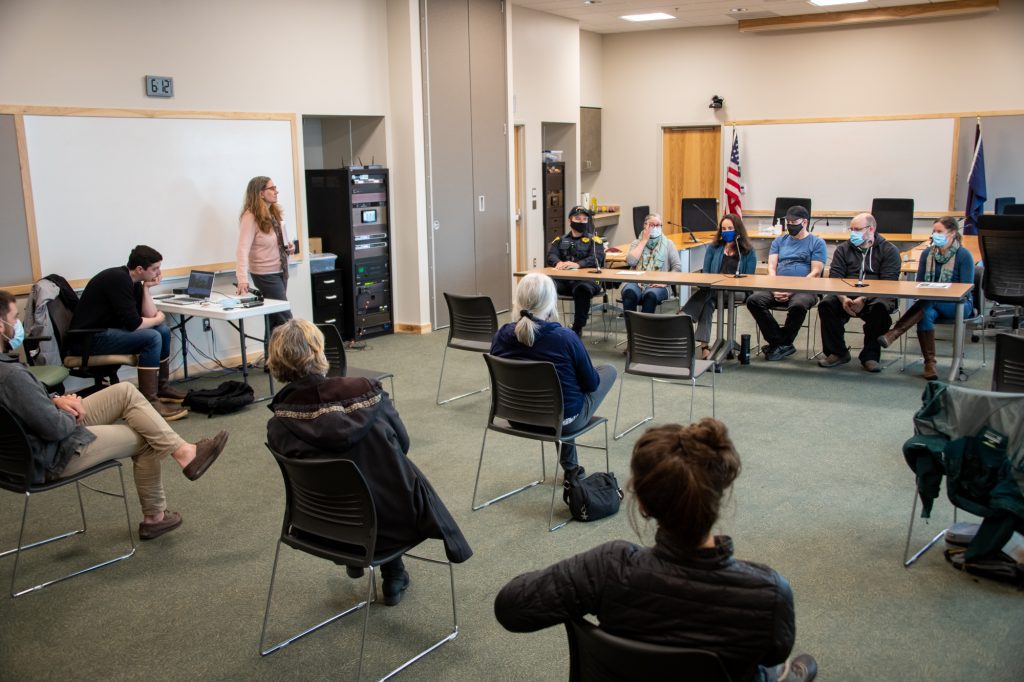
At a Tuesday, Sept. 14 public forum, hospital, police and tribal officials answered the public’s questions about substance abuse issues in Cordova.
Panelists included Native Village of Eyak representative Mark Hoover, Ilanka Community Health Center physician Dr. Brian Iutzi, Sound Alternatives behavioral health program manager Barb Jewell, Ilanka Community Health Center behavioral health coordinator Susie Powell, Cordova Community Medical Center Medical Director Dr. Hannah Sanders and Police Chief Nate Taylor. City Manager Helen Howarth served as emcee and moderator. A recording of the forum can be found on YouTube.
Public questions included topics such as the prevalence of alcohol-related crimes, the availability of addiction recovery resources, and the distinction between addictive and non-addictive substance use.
“When somebody who’s using casually, or even heavily, ends up with a problem… they stop using,” Iutzi said. “They put it down. They don’t pick it back up. The problem with addiction is, there’s a certain percentage of people out there that are unable to put it down, even if it’s killing them.”
Prescription drug abuse was a recurring topic throughout the forum. Local health care providers offer drug take-back programs and have reduced prescriptions for narcotic medications, Sanders said.
“That’s been a big deal for the state of Alaska and for our entire country, and I hope that our population here is seeing that, over the last five or six years, Cordova’s access to prescription medications has significantly declined,” Sanders said. “We are only prescribing, really, what we see as an absolute need.”
When a patient arrives at CCMC with a drug overdose, the police are not summoned, except in occasional instances in which staff feel the patient may be a danger to themselves or others, Sanders said. In those instances, police are, in effect, called to act as security guards to the hospital, and not to penalize the patient for using drugs, she said.
The forum took place three months after the overdose death of 34-year-old Cordova resident Zak Jacobs. Drugs discovered in conjunction with Jacobs’s death were determined to be counterfeit oxycodone pills containing the cheaper but far more potent opioid fentanyl. The pills were likely brought into Cordova from outside the community, and there’s strong evidence that such drugs are manufactured in developing nations where the risk of prosecution is low, Taylor said. Test strips distributed at CCMC and ICHC can be used to screen drugs for fentanyl, allowing a user to avoid an accidental overdose.
Illicit drugs are transported into Cordova by a variety of means, Taylor said. Though recent drug busts have intercepted packages of methamphetamine and heroin sent to Cordova via the postal service, drugs more commonly arrive via the ferry, he said.

Although reliable statistics on youth substance use in Cordova are unavailable, students at Cordova Jr./Sr. High School report that their peers have problems with drugs and alcohol, Jewell said. Currently, local schools don’t offer much in the way of drug and alcohol education, she said. Although the Cordova Police Department would like to return to conducting drug education programs in schools, those programs have fallen to the wayside due to staffing shortages and a lack of officers with the right certification, Taylor said.
“I think it’s a gap here, because the research shows… if we can start earlier, we’ll have better outcomes,” Jewell said.
Minors are usually prosecuted differently than adults for drug-related offenses, and often receive sentences to community work service and counseling programs, Taylor said. Very rarely are minor offenders actually incarcerated, he said.
Anyone with a friend or family member with addiction can aid them not just by referring them to addiction recovery resources, but also by being generally supportive and attentive, Sanders said.
“You want to check in with them: ‘How was your day?’ ‘How was work?’ ‘How are you doing?’” Jewell said. “But also being able to say, ‘I’m worried about you, and here’s why’… making sure that we use ‘I’ statements, and no blaming.”
Substance abuse can also be addressed from a cultural angle through events like Sobriety Celebration and by getting youth involved in cultural activities, Hoover said.
Local addiction recovery resources include fentanyl test strips and Narcan overdose medication, both available from CCMC and ICHC. Additionally, a publicly accessible substance use support group meets Tuesdays from 7-9:30 p.m. at ICHC, beginning Sept. 28. ICHC also offers individual substance abuse and mental health counseling, as well as family counseling and couples counseling, Powell said. The Sound Alternatives clinic at CCMC provides individual and group therapy services, as well as recovery skill services designed to help participants improve how they deal with stressors and to avoid alcohol and drug abuse, Jewell said.
Originally scheduled to be held July 20 at the Cordova Center’s North Star Theatre, the forum was postponed and moved to the center’s community rooms following a novel coronavirus outbreak.





